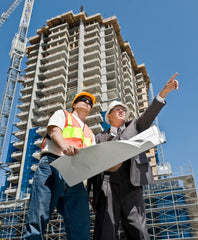General contractors get the job done!
They organize the work on construction sites of all types; hire and supervise subcontractors.
Contractors come in all shapes and sizes, from the largest general to the smallest specialty contractor. It is a business, a highly technical and competitive business. Many of the usual construction contracting specialties such as plumbing, electrical, and mechanical require licenses to operate. The ability to win bids and/or attract business is a function of the contractor's experience and track record. Timely completion, good cost control, quality work, and the avoidance of costly arguments among subcontractors, suppliers, and owners are marks of a good contractor.
The general contractor is a manager, and possibly a tradesman, employed by the client on the advice of the architect, engineer or the architectural technologist or the client him/herself if acting as the manager. A general contractor is responsible for the overall coordination of a project. A general contractor must first assess the project-specific documents (referred to as bid, proposal or tender documents). In the case of renovations, a site  visit is required to get a better understanding of the project. Depending on the project delivery method, the contractor will submit a fixed price proposal or bid, cost plus price or an estimate. The general contractor considers the cost of home office overhead, general conditions, materials and equipment as well as the cost of labor to provide the owner with a price for the project.
visit is required to get a better understanding of the project. Depending on the project delivery method, the contractor will submit a fixed price proposal or bid, cost plus price or an estimate. The general contractor considers the cost of home office overhead, general conditions, materials and equipment as well as the cost of labor to provide the owner with a price for the project.
Contract documents include drawings, project manual (including general, supplementary and/or special conditions and specifications), addendum or modifications issued prior to proposal/ bidding and prepared by a design professional such as an architect. The general contractor may be the construction manager or construction manager at high risk.
Responsibilities:
A general contractor is responsible for providing all of the material, labor, equipment (such as engineering vehicles and tools) and services necessary for the construction of the project. The general contractor hires specialized subcontractors to perform all or portions of the construction work.
The General Contractor is also responsible for the quality of all work performed by any and all subcontractors. The General Contractor's number one priority is safety on the job site.
Responsibilities may include applying for building permits, advising the person they are hired by, securing the property, providing temporary utilities on site, managing personnel on site, providing site surveying and engineering, disposing or recycling of construction waste, monitoring schedules and cash flows, and maintaining accurate records.

